新译林9B英语UNIT 1单元知识点归纳与练习题(含答案)
译林版英语9B Unit1 Asia知识点整理归纳

keep sb from doing sth 阻止某人做某事 同义短语? (2个) 8年级常考!
4. I don't want to go on.
• go on doing sth.指继续做同一件事 如:After a short rest, they went on working. 短暂休息之后,他们继续工作。 • go on with sth . 指继续同一件事,此时with后能接名词,代词,不能跟ing形式。 如: After a short rest, they went on with the work . 短暂休息之后,他们继续那项工作。
练习: - Look at the clouds, so beautiful! - Wow, so many different _______,horses,sheep, flowers... A. sizes B. shapes C. colours D. styles
9. hang的含义及用法
3. We’d better keep moving.
had better do sth 最好做某事 e.g. 我最好在妈妈到家前完成家庭作业。
I'd better finish my homework before mom gets home. keep doing sth. 坚持做某事,一直做某事 e.g. 他一直在说,直到会议结束。
4、当陈述部分的主语为everyone, someone, anyone, no one 等表示人的不定代词 时,疑问部分的主语用they或he Everyone likes Mid-auy, aren‘t they/isn't he? 5、当陈述部分的主语为everything, something, anything, nothing 等表示物的不 定代词时,疑问部分的主语用it Something is wrong with your bike, isn't it?
[译林版]9B Unit 1 综合知识点词汇专练
![[译林版]9B Unit 1 综合知识点词汇专练](https://img.taocdn.com/s3/m/2577de58172ded630a1cb661.png)
9B Unit 1 词汇练习1. This piece of music is worth ____________ (听) to once more.2. As a ____________ (传统的)festival, Dragon Boat Festival is becoming moreand more popular.3. My friend Wang Ying comes from a ____________ (南方) town.4. We must teach children how to go ____________ (横穿) the road safely.5. EXO is one of ____________ (hot) singing groups in China.6. If a river is ____________ (pollute), farmers can’t use water for their crops.7. A big parade was held on Red Square ____________ (remember) the dead in theWorld War.8. I think it is ____________ (fair) to judge a person before you really know him.9. Teenagers need ____________ (communicate) with their parents often.10. He ____________ (wake) up to find himself outside the house yesterday morning.11. We Chinese eat with c____________. What about you?12. Jim has bought some Chinese k____________ and traditional Chinese paintingsas souvenirs when he travelled in Beijing.13. You can see the d____________ dance and lion dance during the Spring Festival.14. People in northern part of China do well in making ____________(剪纸).15. It’s ____________ (累人的) 头climb upto the top of Mount Tai.16.There are many places of interest ____________ in Asia.17.My mother ____________ me up every morning, so I never go to school late.18.It’s sunny and it’s a good idea ____________ a walk along the river.19.China has made rapid progress since 1949, but there’s still a long way____________ before it becomes a developed country.20.The workers started their work at six o’clock in the morning and ____________working until nin e o’clock in the evening.21.Jiangsu Province is in the ____________ (east) part of China.22.My favourite ____________ (attract) is the Great Wall.23.Steve Jobs did some ____________ (wonder) for the phone industry in his life.24.The shirt should be washed by hand to keep its ____________ (形状).25.It’s exciting to watch the ________ (raise) of the national flag at Tian’anmenSquare.26.There are some __________ (洞穴) in the mountains and people used to livethere.27.Some animals live in the ____________ (地下的) caves.28.The hospital is in the ____________ (东南方) of the town.29.The children waved their ____________ (flag) as President Obama went by.30.Have you read the ____________ (皇帝) New Clothes?31.Sandy sits in the m____________ of the classroom.32.Guilin is famous for its waters and mountains in different s____________.33.The Terracotta warriors is the eighth w____________ of the world.34.When there is a danger, we h____________ out the red flag.35.Don’t p____________ at others with your chopsticks while eating.36.How many ____________ (州) are there in America?37.He asked me if I knew something about Japanese ____________ (文化)?38.Singapore is an A____________ country.39.They will take a t____________ of Beijing tomorrow.40.They ____________ (plan) to travel to Japan already.41.They will visit the imperial palace on the ____________ (three) day.42.On New Year’s Day, people in Japan like to wear ____________ (tradition)clothes to celebrate it.43.Do you know which is the ____________ (high) mountain in the world?44.He asked me if I could speak ____________ (印地语).45.It’s known that China has over 1.3 b____________ people.46.The desk is made of ____________ (铁), so it’s heavy.47.You should know about the ____________ (风俗) in that country before goingthere.48.Where does the woman in a ____________(莎丽) come from?49.Let’s go t o the ____________ (庙会) to do some shopping, shall we?50.----What’s the p____________ of your city? ----About 2 million people.51.“IT” is the short form of “information t____________”.52.He raised crops ____________(主要) for the use of his family.。
【原创】江苏译林版9B Unit 1 重点知识归纳
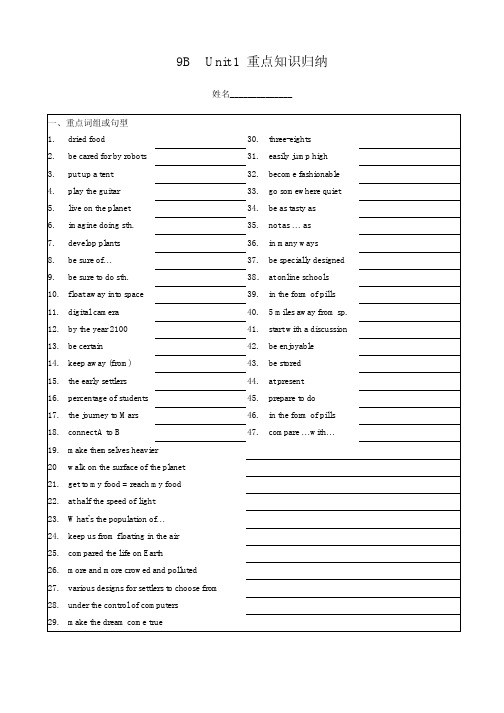
9B Unit 1 重点知识归纳姓名______________一、重点词组或句型1. dried food 30. three-eights2. be cared for by robots 31. easily jump high3. put up a tent 32. become fashionable4. play the guitar 33. go somewhere quiet5. live on the planet 34. be as tasty as6. imagine doing sth. 35. not as … as7. develop plants 36. in many ways8. be sure of…37. be specially designed9. be sure to do sth. 38.at online schools10. float away into space 39. in the form of pills11. digital camera 40. 5 miles away from sp.12. by the year 2100 41. start with a discussion13. be certain 42. be enjoyable14. keep away (from) 43. be stored15. the early settlers 44. at present16. percentage of students 45. prepare to do17. the journey to Mars 46. in the form of pills18. connect A to B 47. compare …with…19. make themselves heavier20 walk on the surface of the planet21. get to my food = reach my food22. at half the speed of light23. What’s the population of…24. keep us from floating in the air25. compared the life on Earth26. more and more crowed and polluted27. various designs for settlers to choose from28. under the control of computers29. make the dream come true二、重点、难点1. How do you like …?= How do you find …? = What do you think of …?【例】How do you like your teacher, Mr. Li? (改为同义句)(1) What do you your teacher, Mr. Li?(2) How do you f your teacher, Mr. Li?2. get to(1) 吃到、够到eg. The little child too short to get to the food on the table.(2) 到达eg. When we got to the airport, the plane had taken off.【比较】get to + 地方(注意:当get to 后接here, there, home 等副词时,必须去掉to)arrive in + 大地方arrive at + 小地方reach + 地方eg. I will call you as soon as I get to / arrive in / reach Beijing.3. can 与be able tocan 用于一般现在时和一般过去式(could) 强调人们有做某事的能力be able to 现在时、过去时、将来时、完成时都可用强调通过努力而做某事eg. My son can swim now but he couldn’t last year.Though the fire spread through the hotel very quickly, everyone was able to get out. (表示通过努力)4. care for (1) = take care of = look after(2) = care about eg. He spent his life caring for the poor.5. form (1) n. 形状、形式eg. Swimming is a good form of exercise.(2) n. 表格eg. Please fill in the form first.(3) v. 组成、形成eg. We are going to form a class for beginners in English.6. play the guitarplay footballplay chess / cardshave breakfast / lunch / supperby car / bus / planeNew Year’s Day / Women’s Dayspeak Chinese / teach English7. put 常考词组put away 把…收拾(干净)put out 扑灭(火)put off 推迟put down 放下、记下put up 举起、建造、竖起put on 穿上put back 放回8. imagine ( n. imagination想象力、幻觉adj. imaginative 有想象力的)(1) vi “设想、想象”eg. You will like the film, I imagine.(2) vt “想象、设想、猜想”+ 名词、动名词、从句等eg. Try to imagine being on the moon.9. by the year 2100(1) by +将来的时间,常用将来时eg. Daniel is thinking about what life will be like by the year 2050.(2) by +过去的时间,常用过去完成时eg. By the end of last year, it had produced over 2000 computers.10. more and more beautiful“比较级+ 比较级” stronger and stronger11. crowded 拥挤的、挤满了人的crowd 群、人群eg. There were crowds of people at the theatre.eg. There was a crowd of 20,000 people at the football match.12. polluted 受到污染的pollute 污染eg. All those waste products are polluting the river.pollution [U] air ~, noise ~eg. There is a lot of pollution in the air here.13. hopefully hopeful hopelesshope to do eg. They waited wand waited because they hoped to see their favourite film stars.hope that eg. My father hopes that I can be a host in the future.wish to do eg. I wish to come tomorrow.wish sb to do eg. My parents wish me to become a policeman when I grow up.14. too…to…常与so…that…, not…enough to…的句型转换【重点:so that结构参考8B Unit 5, 9A Unit 2】eg. The water is too dirty to drink. = The water is so dirty that we can’t drink it.= The water is not clean enough to drink.15. at present 常用于现在进行时eg. My cousin is making kites at present.16. spacecraft 单复数同形 a manned spacecraft17. spend take pay cost afford 【重点:请参考8B Unit 2, 9A Unit 1】18. at the speed of at high /great speed at full / top speedeg. The car is driving at the speed of 150 kilometres an hour.19. humanhuman being 人类human nature 人性human right 人权【注意几个单词的复数】humans, Germans, walkmanspostmen, policemen, Englishman等20. develop development developed(发达的)developing (发展中的)21. three-eighths 分数的表示法:分子用基数词;分母用序数词(1) 分子大于1时,分母要加-s; one fourth three fourths(2) 分子和分母之间可用连字符,也可不用one-third【注意:分数作主语时】当分数作主语时,谓语动词的形式取决于与分数相关的名词或代词的数:(1) 如果主语是单数或不可数名词,谓语动词用单数形式eg. Three fourths of the surface is covered with water on Earth.(2) 如果主语是可数名词的复数,谓语动词用复数形式eg. About one-fifth of the students in our class are from the countryside.22. 代词it, that, one的区别it 特指上文提到的“同个、同物”I can’t find my pen. Where is it?that 特指上文提到的“同一类”,但不是同一个;常用于单数可数名词和不可数名词The weather in Moscow is colder than that in Beijing.one 泛指上文提到的名词所表示的人或事物的任一个I can’t find my pen. I have to buy one.23. prevent sb ( from ) doing = stop sb ( from ) doing = keep sb from doing【注意】在用于被动语态中,from不能省略He was stopped from driving because he was drunk last night.24. compare… with…. 把…与…进行比较eg. If you compare British football with American football, you will find many differences.compare…to…把…比作eg. Children are often compared to flowers.25. in many ways 在许多方面in different ways 以不同的方式in the same way 以同样的方式in some ways 在某些方面,在某种程度上in the way 挡道、妨碍on the way…在路上、在途中by the way 顺便问一下26. connect…to…把…和…连接起来eg. Did you connect the keyboard to the computer properly?27. as + 形容词/ 副词的原形+ asnot so /as + 形容词/ 副词的原形+ as “不如”eg. Jack doesn’t run as fast as Tom.= Tom runs faster than Jack.28. space (1) 太空[U],前面一般不用冠词eg. On June 16th, 2012, Liu Yang became the first woman to go into space in China.(2) 空间[U] = roomeg. Excuse me, can you make some space for me?29. population 人口(1) [U] eg. What is the population of China? Shanghai has a population of 20,800,000 at present.(2) 人口的“多和少”时,只能用large或small 【参考price的用法】The population of China is much larger than that of Japan.30. enjoyable enjoy ( oneself / doing sth )31. provide sb. with sth = provide sth for sb 【注意常用于被动语态】eg. They provide the poor people with food and clothes.offer sb sth = offer sth to sb. eg. He offered the people his great help.32. fix up = repair eg. He is fixing up his bike.fix…on eg. He fixed the machine on the ground.33. advantage [C U] disadvantage [C U] 用作可数名词的时候较多eg. Living in the big city has many advantages, such as good schools, libraries, hospitals and theatres.34. start with… = begin with …35. harm [U] harmful harmless(1) harm [U] eg. There is no harm in trying.(2) do harm to eg. Such books do great harm to young people.(3) be harmful to eg. Watching too much TV is harmful to your eyesight.36. have sb. do sth. 让某人做某事eg. Why not have your brother take a message for us?have sth. done (常指请人把)某事被做eg. Next Sunday, I will have my computer repaired.have sth. to do 有某事要做eg. I have something important to say.37. feel like doing 想做某事would like to do38. go somewhere quietgo somewhere quietly39. specially “专门、特地”eg. The red dress is specially designed for Zhang Ziyi.especially “尤其、特别地”eg. Stay away from junk food, please. It’s bad for us, especially for children.40. can 和could(1) 表示能力“能、会”( could是过去式) eg. I can speak Japanese.(2) 表示请求“可以”( could比can更客气) eg. Can / Could I use this dictionary? Yes, You can.(3) 表示推测“一定不”( could是过去式) eg. This pen can’t be Li Ming’s.41. may 和might(1) 表示“允许”( might是过去式) eg. You may sit down now.(2) 表示“请求”( might 比may更委婉) eg. May / Might I try again? Yes, you may. / No, you may not.42. 表示请求时(1) can 非正式用语,口语,请求的对象一般是同学或朋友(2) could 比can 更委婉,常用于老师或成人之间(3) may 既正式又礼貌,用于陌生人或尊敬的人之间(4) might 非常正式,较少用43. 宾语从句(一)(宾语从句与直接引语改为间接引语有很多相同之处)掌握好宾语从句的内容,主要是从连词、语序和时态3个方面着手。
新牛津英语9bunit1-2复习含答案
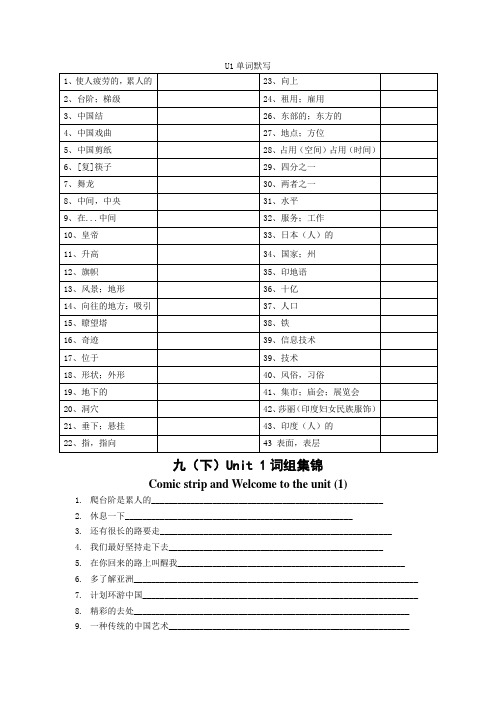
U1单词默写九(下)Unit 1词组集锦Comic strip and Welcome to the unit (1)1.爬台阶是累人的_____________________________________________________2.休息一下____________________________________________________3.还有很长的路要走_____________________________________________________4.我们最好坚持走下去_________________________________________________5.在你回来的路上叫醒我____________________________________________________6.多了解亚洲_________________________________________________________________7.计划环游中国_______________________________________________________________8.精彩的去处_______________________________________________________________9.一种传统的中国艺术_______________________________________________________10.谢谢你的建议__________________________________________________________Reading(2)1.中国的首都_______________________________________________________________2.在北京古城的中央________________________________________________________3.明、清朝的皇帝曾经住在那里。
9BUnit1知识点(知识讲解)(K12教育文档)

9BUnit1知识点(知识讲解)(word版可编辑修改)编辑整理:尊敬的读者朋友们:这里是精品文档编辑中心,本文档内容是由我和我的同事精心编辑整理后发布的,发布之前我们对文中内容进行仔细校对,但是难免会有疏漏的地方,但是任然希望(9BUnit1知识点(知识讲解)(word版可编辑修改))的内容能够给您的工作和学习带来便利。
同时也真诚的希望收到您的建议和反馈,这将是我们进步的源泉,前进的动力。
本文可编辑可修改,如果觉得对您有帮助请收藏以便随时查阅,最后祝您生活愉快业绩进步,以下为9BUnit1知识点(知识讲解)(word版可编辑修改)的全部内容。
9B Unit B1.how+ to +动词原形构成的不定式短语,在句子中可作宾语、主语、同位语等。
I don’t know how to go to the post office.How to operate the machine is a problem。
疑问代词who,what,which及疑问副词when,where等也可与动词不定式连用,构成不定式短语,在句子中作主语、宾语、表语、同位语等。
The question is which one to choose。
2.open up开辟A new area has been opened up for trade.They want to open up a new route。
1)(机会、新情况)出现With a microscope, a whole new world of investigation opens up。
2)打开,开启Open up! This is the police!3.the American continents 美洲大陆Did Columbus discover the American continents?continent 大陆 ocean海洋the seven continentAsia亚洲 Europe欧洲 North America北美洲 South America南美洲Africa非洲 Ocean大洋洲 Antarctica 南极洲the four oceans四大洋:the Pacific Ocean太平洋 the Atlantic Ocean大西洋the Indian Ocean印度洋 the Arctic Ocean北冰洋4.set up 建立;设立We should set up a new school here.They must set up a state of their own.5.nearly adv。
牛津译林版9B 第一单元复习专题练习—动词填空含答案
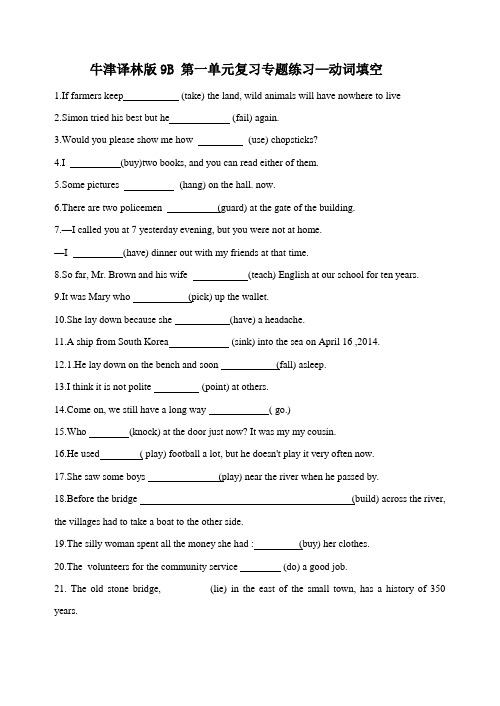
牛津译林版9B 第一单元复习专题练习—动词填空1.If farmers keep (take) the land, wild animals will have nowhere to live2.Simon tried his best but he (fail) again.3.Would you please show me how (use) chopsticks?4.I (buy)two books, and you can read either of them.5.Some pictures (hang) on the hall. now.6.There are two policemen (guard) at the gate of the building.7.—I called you at 7 yesterday evening, but you were not at home.—I (have) dinner out with my friends at that time.8.So far, Mr. Brown and his wife (teach) English at our school for ten years.9.It was Mary who (pick) up the wallet.10.She lay down because she (have) a headache.11.A ship from South Korea (sink) into the sea on April 16 ,2014.12.1.He lay down on the bench and soon (fall) asleep.13.I think it is not polite (point) at others.e on, we still have a long way ( go.)15.Who (knock) at the door just now? It was my my cousin.16.He used ( play) football a lot, but he doesn't play it very often now.17.She saw some boys (play) near the river when he passed by.18.Before the bridge (build) across the river, the villages had to take a boat to the other side.19.The silly woman spent all the money she had : (buy) her clothes.20.The volunteers for the community service (do) a good job.21. The old stone bridge,_________ (lie) in the east of the small town, has a history of 350 years.22.In order ( pass) the exam, my sister worked as hard as she could.23.The price of cotton (rise) a lot.As a result, the factories plan to raise the price of their cotton clothes.24.We have great fun (cycle) around Nanjing.25.It is necessary to tell him (put) on more clothes because it"s cold outside,26.They built watchtowers (protect) the village from robbers.27.I ( write) to you, because I am afraid to talk about it face to face.28.In 50 years of travelling .he ( travel) every country in the world.29. Go on _______ (finish) the other exercise after you finish this one.30.When Mary got home, her father ( cook).31.I want to buy this kind of cloth, because I (tell) the cloth washes well.32.The magazine is well worth (read) so he advised me to buy it.33.Tony got up early in order to (be) the first one to get to the classroom.34.The boy raised his hand and asked if the sun (rise) in the east every day.35. You're not so different now. You still love to (praise) when you've done well.36. It __________ (report) that H7N7 is spreading in some cities and towns this winter.37. While I _________ (walk) along the river, my mobile phone rang from my cousin Millie.38. Unless it is fine this weekend, our spring field trip __________ (cancel).39. It’s said that the air in this city not very clean, but I don’t think the pollution is as serious as I _________ (imagine).40. We are told not (take) much money unless we need to buy presents for our parents.参考答案1.taking2. failed3. to use4. have bought5. are hanging6.guarding7. was having8.have taught9. picked 10. had11.sank 12. fell 13. to point 14. to go 15. was knocking16. to play 17. playing 18. was built 19. buying 20. are doingy 22. to pass 23. has risen 24. cycling 25. to put26. to protect 27. am writing 28.has travelled 29.finishing 30. was cooking 31.am told 32. reading 33. be 34. rises 35.be praised36.is reported 37.was walking; 38.will be canceled 39.imagined; 40. to take。
最新版牛津译林版九年级上册英语Unit1单元知识点复习及答案

最新版牛津译林版九年级上册英语Unit1单元知识点复习及答案九年级英语第一单元知识点复卷一、英汉互译(10分)1.eat up2.整天3.和……一样好4.达到高标准的工作5.not get angry even after waiting for a long time6.三思而后行7.neither…nor… 8.赢得高度赞扬 9.day after day 10.不仅……而且…… 11.either…or… 12.总共 13.be ahead of 14.据说 15.fall behind 16.保持秩序 17.pay n to 18.被分成 19.show off 20.想出二、单项选择(15分)1.C2.B3.B4.B5.D删除了题目中的标点错误)1.It was in Shanghai that I met my classmate.(改写为强调句)2.The food was so us that I couldn't eat it all.(改写为结果状语从句)3.He is so clever that he can always come up with different ideas.(改写为结果状语从句)4.XXX he nor his parents are from the USA.(改写为否定句)5.I have great fun playing this game.(改写为现在分词作后置定语)6.Are you going to take on this challenge?7.His room is as good as new after it is cleaned.8.As a doctor。
you should keep secrets for your patients.9.Either this Sunday or next Sunday is okay.10.The beginning of the movie was boring。
【译林版】初三英语练习(9BUnit1)-附答案
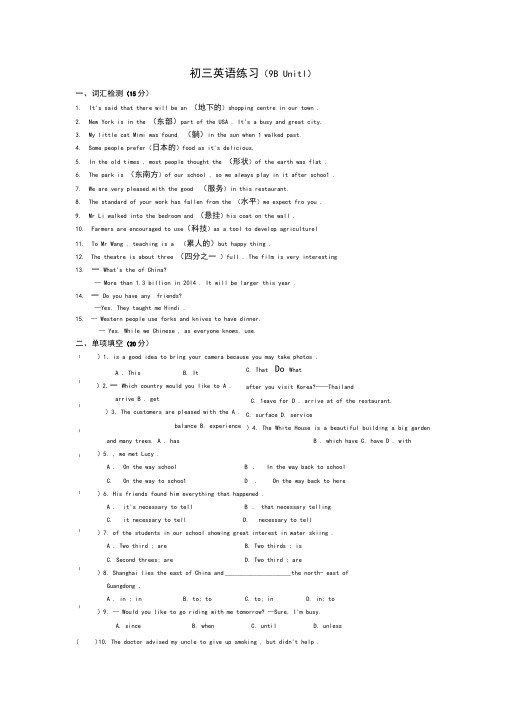
初三英语练习(9B Unitl )一、词汇检测(15分)1. It's said that there will be an (地下的)shopping centre in our town .2. New York is in the (东部)part of the USA . It's a busy and great city.3. My little cat Mimi was found (躺)in the sun when 1 walked past.4. Some people prefer (日本的)food as it's delicious.5. In the old times , most people thought the (形状)of the earth was flat .6. The park is (东南方)of our school , so we always play in it after schoo1 .7. We are very pleased with the good (服务)in this restaurant.8. The standard of your work has fallen from the (水平)we expect fro you . 9. Mr Li walked into the bedroom and (悬挂)his coat on the wall . 10. Farmers are encouraged to use (科技)as a tool to develop agriculturel 11. To Mr Wang , teaching is a (累人的)but happy thing .12. The theatre is about three (四分之一 )full . The film is very interesting 13.一 What's the of China?— More than 1.3 billion in 20l4 . It will be larger this year .14.一 Do you have any friends?—Yes. They taught me Hindi .15. — Western people use forks and knives to have dinner.— Yes. While we Chinese , as everyone knows, use.二、单项填空(20分))1. is a good idea to bring your camera because you may take photos .C. ThatDo Whatafter you visit Korea?——ThailandC. 1eave for D . arrive at of the restaurant.C. surfaceD. service)4. The White House is a beautiful building a big gardenand many trees. A . hasB . which have C. have D . with)5. , we met Lucy .A . On the way schoolB . In the way back to school C.On the way to schoo1D .On the way back to here)6. His friends found him everything that happened .A . it's necessary to tellB . that necessary telling C.it necessary to tellD. necessary to tell)7. of the students in our school showing great interest in water skiing .A . Two third ; are B. Two thirds ; is C. Second threes; areD. Two third ; are)8. Shanghai lies the east of China and _____________________ t he north- east ofGuangdong . A . in ; inB. to; toC. to; inD. in; to)9. — Would you like to go riding with me tomorrow? —Sure, I'm busy.A. sinceB. whenC. untilD. unless( )10. The doctor advised my uncle to give up smoking , but didn't help .(((((( (((A . ThisB. It)2.一 Which country would you like to A .arrive B . get)3. The customers are pleased with the A . balance B. experienceA . helpB . it C. who D . which( )11. It was such a day that 1 felt so .A . tiring ; tiredB . tiring ; tiring C. tired ; tired D . tired ; tiring ( )12. Sandy has 1ots of kites different shapes and colours.A . atB . from C. with D . in( )13. There are many shops on side of the street and they untilmidnight every day .A . both; are openB . either; aren't closedC. either; are closed D . both; aren't closed( )14. Shanghai is not only famous its beauty but also famous aninternational city .A . for; for B. as; as C. for; as D. as; for( )15. We decide to make a rule for us to turn off the lights at 10 : 30 P. m.A . that B. this C. it D . one( )16. The experts think that India's population may be than China's 2020.A. much; byB. more; inC. 1arger; byD. 1arger; on ( )17. — Can a plane fly the Atlantic Ocean?-Yes, but it needs to go the clouds for hours .A. across; throughB. through; overC. across; acrossD. over; in ( )18. of them felt very tired but quite happy after sports meeting.A . Everyone; a two days B. Every one; the two daysC. Every one; a two- day D . None; a two day( )19. I think important we should learn English well .A. is; thatB. it; thatC. it's; whatD. it; what ( )20. — Hi . Linda . I felt so nervous about tomorrow 's test.一. You can pass it.A . Take it easyB . CongratulationsC. Have a good time D . Help yourself三、完形填空(10分)Years ago。
译林牛津9B Unit 1 Asia 教材全解

译林牛津9B Unit 1 Asia 教材全解【教材内容解析】ic strip&Welcome to the unit(1)Wow, the Great Wall is amazing, isn’t it? (P. 6)反意疑问句是提出情况或者看法,问对方是否同意的句子。
一般由陈述句和反意疑问句构成。
反意疑问句部分要与前面的陈述句用逗号隔开,句末用问号。
如果陈述句部分是肯定结构,反意疑问句部分就用否定结构,反之亦然。
反意疑问句部分的主语需用代词,并与陈述句部分的主语一致,谓语动词在人称、数和时态上也要与陈述句部分一致。
反意疑问句的构成如下:肯定的陈述句+be动词/助动词/情态动词+not+主语(代词)否定的陈述句+be动词/助动词/情态动词+主语(代词)反意疑问句还有如下一些值得注意的情况:①陈述句部分含有never, few, little, nothing, nobody, no, hardly, none等表示否定意义的词时,反意疑问句部分用肯定形式。
He has few friends at school, does he?注意:当陈述句谓语动词是含有否定意义的前缀的词时,反意疑问句部分还是要用否定形式。
He dislikes smoking, doesn’t he?②陈述句部分是there be结构,反意疑问句用be there。
There is a book on the desk, isn’t there?③当陈述句部分的主语是指物的不定代词,something, anything, everything等时,反意疑问句主语用it;如果主语是指人的不定代词somebody, anybody, everybody等时,反意疑问句主语用they或he。
Someone wants to see you, don’t they?④当陈述句的主语是this,that时,反意疑问句主语用it;当陈述句的主语是these,those时,反意疑问句主句用they。
译林版英语9B+UNIT1+重点词组整理
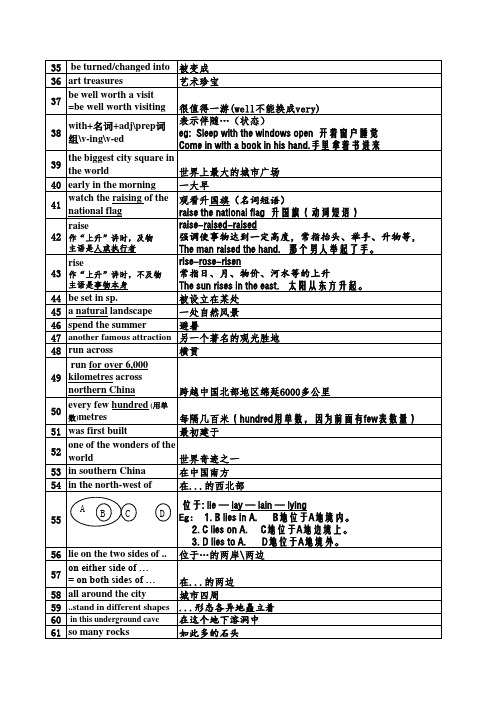
36 art treasures
艺术珍宝
37 be well worth a visit =be well worth visiting
38
with+名词+adj\prep词 组\v-ing\v-ed
很值得一游(well不能换成very)
表示伴随…(状态) eg: Sleep with the windows open 开着窗户睡觉 Come in with a book in his hand.手里拿着书进来
44 be set in sp.
被设立在某处
45 a natural landscape
一处自然风景
46 spend the summer
避暑
47 another famous attraction 另一个著名的观光胜地Leabharlann 48 run across
横贯
run for over 6,000 49 kilometres across
northern China
跨越中国北部地区绵延6000多公里
50 every few hundred (用单 数)metres
每隔几百米(hundred用单数,因为前面有few表数量)
51 was first built
最初建于
52 one of the wonders of the
world
世界奇迹之一
位于: lie — lay — lain — lying Eg: 1. B lies in A. B地位于A地境内。
2. C lies on A. C地位于A地边境上。 3. D lies to A. D地位于A地境外。 位于…的两岸\两边
译林 牛津英语9B Unit1 Asia 单元测试卷(包含答案)

牛津英语9B Unit1 Asia 单元考题汇总一、词汇A)根据句子意思,用括号中所给词的正确形式填空,每空填一词。
1. Twenty-four emperors (皇帝)of the Ming and Qing d______ used to live in the Forbidden City.2.As we know that there a great number of wonderful buildings and art ________ (珍宝) left in the ancient time in the Palace Museum.3.In the Summer Palace, a large Chinese garden set in the natural _________ (景观).4.Today, in most cities in our country, people can spend no money ________ (租用) the public bicycles to ride around the city.5.They climbed ________ (向上) along the steep steps around the village.B)根据句意及汉语提示,写出各单词的正确形式,每空填一词。
1.Guilin, on either side of Lijiang River, is in _________ (south) China.2.People in Paris on the street often looked worried, hurried and __________ (friend).3.Here is an old ____ (say) “He who has never been to the Great Wall is not a true man”.4.It’s quite cold here in winter. The lake which takes up three quarters of this area is________ (freeze) throughout the winter.5.__________ (tradition) clothes for Indian women are saris, which can be seen in Indian films.C).、用括号内所给动词的正确形式填空1. It’s said that the air in this city not very clean, but I don’t think the pollution is as serious as I _____ (imagine).2.We can’t suppose what the population _________ (be) nowadays. It’s great burden for our country.3.After reading the guide book, you will find it quite difficult _________ (reach) the top of the Great Wall in Two hours.4.While I _________ (walk) along the river, my mobile phone rang from my cousin Millie.5. Unless it is fine this weekend, our spring field trip __________ (cancel).6.I find the notices which __________ (hang) by you at the entrance missing.7.This kind of medicine will lead to death if too much ________. (take)二、单项选择( ) 1.Nanjing, ______ capital city of Jiangsu Province, is _______ ancient city with a long history.A. the; anB. a; theC. the; aD. /; the( ) 2.Diaoyu Island is ______ the east of China, ________ the north-east of Taiwan Island and ______ the south-west of Japan.A. in; in; inB. to; on; inC. on; to; inD. in; in; to( ) 3.—We’d better buy cotton clothes instead of ones made of animal fur.—You’re right. But the price of cotton has _____a lot. As a result, the factories plan to ____the price of their cotton clothes.A. raised; raiseB. Raised; rise C .risen; raise D. risen; rise ( ) 4.—Can a plane fly__________ the Atlantic Ocean?—Yes, but it needs to go_______ the clouds for hours.A.through, acrossB. across; throughC. across, acrossD. through, through ( ) 5.—What do you usually do at the weekend?—I _____ TV series about Anti-Japanese War(抗战).ed to watchB. was used to watchingC. am used to watchD. get used to watching( ) 6.—Let’s watch the popular TV program “I am a Singer”, shall we?—_________________. It has been over for some time.A.Sounds greatB. Yes, we shallC. I’m afraid notD. No, we shan’t( ) 7.On the top of the hill_______ an ancient tower _______ was built 500 years ago.A.ran, thatB. stood, whichC. lived, whoD. lay, whom( ) 8.—Thank you very for your ________ on my plan for the summer holiday.—You’re welcome. I hope they are worth ________.A. advice; to takeB. suggestions; takingC. advice; takingD. suggestions; to take( ) 9.—______ we live near Tian’anmen Squar e, Shall we start from here?—Good idea. And I think the Palace Museum is also wonderful pace to go.A. AsB. BecauseC. Since D . Although( ) 10.Three quarters of the area __________ covered with wetland, and a quarter of the red-crowned cranes __________ living happily here.A. is; isB. are; isC. is; areD. are; are( ) 11.—What kind of house would like to buy,Mr. White?—________ with a large garden around _______.A. One; oneB. It; itC. It; one;D. One; it( ) 12.—Shall I come to the hospital for my heart trouble you on Thursday on On Friday, Dr. Smith?—____________. I’m at work these days.A. EitherB. BothC. NeitherD. None三、句型转换1. I think that he seems dishonest sometimes. (构成反义问句)I think that he seems dishonest sometimes, _____________________ ?2. He is foolish to say such a thing. (改为同义句)_________ is foolish _________ him to say such a thing.3. Many visitors come and visit Guilin because of its fantastic landscape.(改为同义句)Many visitors come and visit Guilin ________ it ________ fantastic landscape.4. The population of Hai’an is about a million. (对划线部分提问)_______ _________ the population of Hai’an?5. Twenty-four emperors used to live in the Palace Museum. (改为否定句)Twenty-four emperors _________ _________ to live in the Palace Museum.四、根据所给中文完成句子1. 许多游客喜欢一大早聚集在那里观看升国旗仪式。
牛津译林版英语9B Unit1 重点知识总结
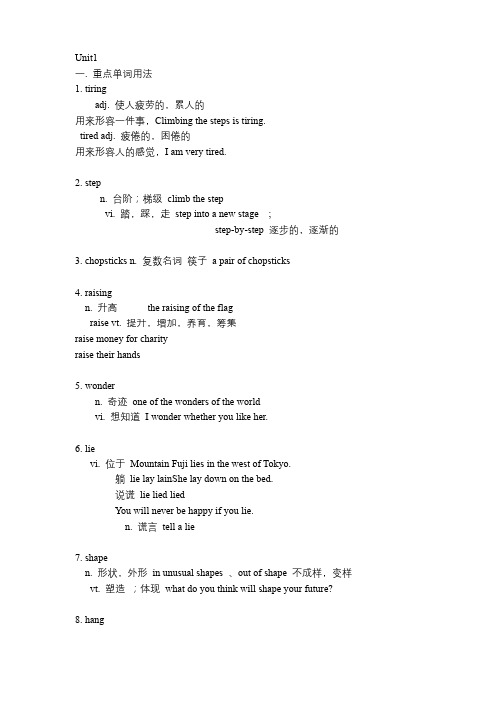
Unit1一. 重点单词用法1. tiringadj. 使人疲劳的,累人的用来形容一件事,Climbing the steps is tiring.tired adj. 疲倦的,困倦的用来形容人的感觉,I am very tired.2. stepn. 台阶;梯级climb the stepvi. 踏,踩,走step into a new stage ;step-by-step 逐步的,逐渐的3. chopsticks n. 复数名词筷子a pair of chopsticks4. raisingn. 升高the raising of the flagraise vt. 提升,增加,养育,筹集raise money for charityraise their hands5. wondern. 奇迹one of the wonders of the worldvi. 想知道I wonder whether you like her.6. lievi. 位于Mountain Fuji lies in the west of Tokyo.躺lie lay lainShe lay down on the bed.说谎lie lied liedYou will never be happy if you lie.n. 谎言tell a lie7. shapen. 形状,外形in unusual shapes 、out of shape 不成样,变样vt. 塑造;体现what do you think will shape your future?8. hangvi. Vt. 垂下;悬挂hang hung hungI hung the washing in the yard yesterday.绞死hang hanged hangedThe criminal was hanged.9. pointvi. 指,指向point at sb/sthn. 分数points10. eastern adj. 东部的,东方的eastern Chinaeast n. 东方in the east of China11. service n. 服务;工作a high level of serviceserve vt&vi. 服务;任职we must serve the people heart.12. Japaneseadj. 日本的it’s Japanese.n. 日本人some JapaneseJapan n. 日本He is from Japan.二、重点词组、句型用法1. Wow, the Great Wall is amazing ,isn’t it?反义疑问句的用法:前肯后否是自然,前否后肯也常见;短句 not 如出现,必须缩写是习惯。
9BUnit1Asia知识点归纳
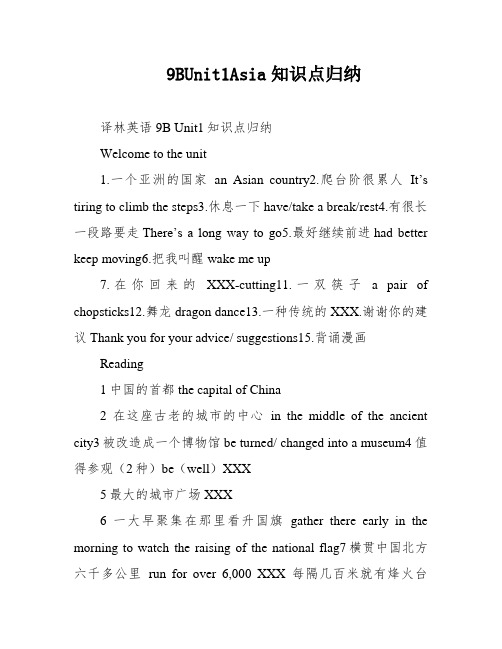
9BUnit1Asia知识点归纳译林英语9B Unit1知识点归纳Welcome to the unit1.一个亚洲的国家an Asian country2.爬台阶很累人It’s tiring to climb the steps3.休息一下have/take a break/rest4.有很长一段路要走There’s a long way to go5.最好继续前进had better keep moving6.把我叫醒wake me up7.在你回来的XXX-cutting11.一双筷子 a pair of chopsticks12.舞龙dragon dance13.一种传统的XXX.谢谢你的建议Thank you for your advice/ suggestions15.背诵漫画Reading1中国的首都the capital of China2在这座古老的城市的中心in the middle of the ancient city3被改造成一个博物馆be turned/ changed into a museum4值得参观(2种)be(well)XXX5最大的城市广场XXX6一大早聚集在那里看升国旗gather there early in the morning to watch the raising of the national flag7横贯中国北方六千多公里run for over 6,000 XXX每隔几百米就有烽火台with watchtowers every few hundred metres9世界奇迹之一one of the wonders10位于漓江的两侧on XXX11分歧外形的耸立XXX12一个地下溶洞an underground cave13奇形怪状in XXX14悬挂下来hang down15指向上方point upwards16被颂扬为。
/被誉为。
XXX搭船沿着。
【最新】牛津译林版九年级英语上册UNIT 1单元知识点归纳及练习题(含答案)
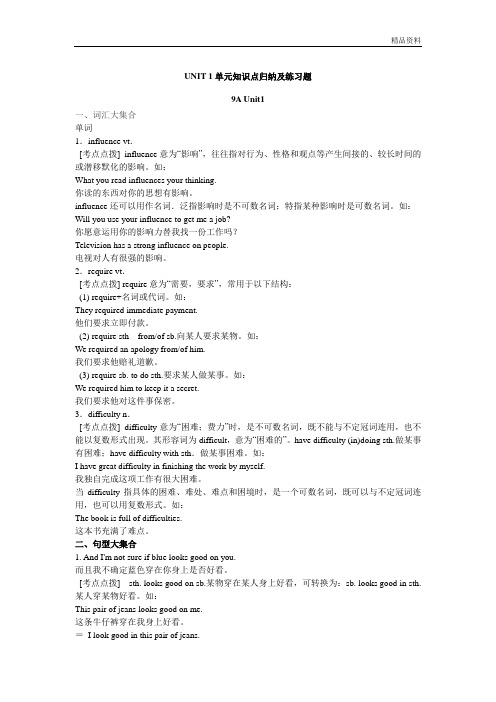
UNIT 1单元知识点归纳及练习题9A Unit1一、词汇大集合单词1.influence vt.[考点点拨] influence意为“影响”,往往指对行为、性格和观点等产生间接的、较长时间的或潜移默化的影响。
如:What you read influences your thinking.你读的东西对你的思想有影响。
influence还可以用作名词.泛指影响时是不可数名词;特指某种影响时是可数名词。
如:Will you use your influence to get me a job?你愿意运用你的影响力替我找一份工作吗?Television has a strong influence on people.电视对人有很强的影响。
2.require vt.[考点点拨] require意为“需要,要求”,常用于以下结构:(1) require+名词或代词。
如:They required immediate payment.他们要求立即付款。
(2) require sth from/of sb.向某人要求某物。
如:We required an apology from/of him.我们要求他赔礼道歉。
(3) require sb. to do sth.要求某人做某事。
如:We required him to keep it a secret.我们要求他对这件事保密。
3.difficulty n.[考点点拨] difficulty意为“困难;费力”时,是不可数名词,既不能与不定冠词连用,也不能以复数形式出现。
其形容词为difficult,意为“困难的”。
have difficulty (in)doing sth.做某事有困难;have difficulty with sth.做某事困难。
如:I have great difficulty in finishing the work by myself.我独自完成这项工作有很大困难。
牛津译林版 9B Unit1 Asia同步练习(含解析)
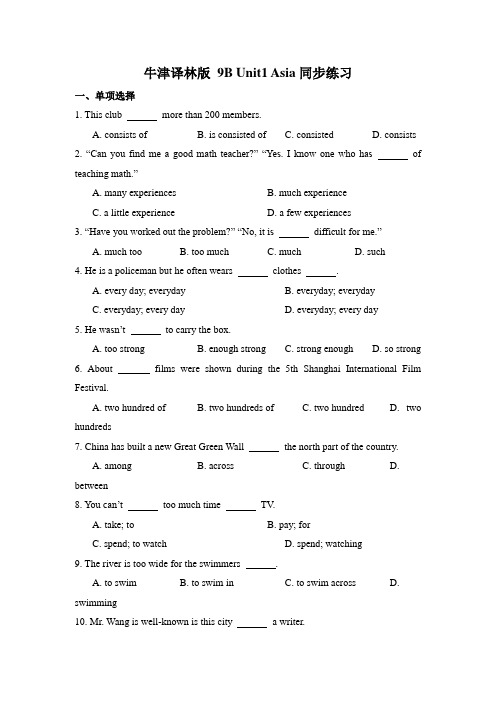
牛津译林版9B Unit1 Asia同步练习一、单项选择1. This club more than 200 members.A. consists ofB. is consisted ofC. consistedD. consists2. “Can you find me a good math teacher?” “Yes. I know one who has of teaching math.”A. many experiencesB. much experienceC. a little experienceD. a few experiences3. “Have you worked out the problem?” “No, it is difficult for me.”A. much tooB. too muchC. muchD. such4. He is a policeman but he often wears clothes .A. every day; everydayB. everyday; everydayC. everyday; every dayD. everyday; every day5. He wasn’t to carry the box.A. too strongB. enough strongC. strong enoughD. so strong6. About films were shown during the 5th Shanghai International Film Festival.A. two hundred ofB. two hundreds ofC. two hundredD. two hundreds7. China has built a new Great Green Wall the north part of the country.A. amongB. acrossC. throughD. between8. You can’t too much time TV.A. take; toB. pay; forC. spend; to watchD. spend; watching9. The river is too wide for the swimmers .A. to swimB. to swim inC. to swim acrossD. swimming10. Mr. Wang is well-known is this city a writer.A. likeB. asC. forD. of11. Although he is young, he has much knowledge of computer.A. andB. butC. orD. /12. Everyone should make a contribution to the environment.A. protectB. protectsC. protectedD. protecting13. Something must be wrong with your watch, ?A. isn’t itB. aren’t theyC. must itD. mustn’t they14. Nobody is in the classroom, ?A. is heB. isn’t heC. are theyD. aren’t they15. I’m quite thirsty and hot. I want to drink ice water.A. a few moreB. more a fewC. a little moreD. more a little16. When I was at school, I up very late, reading story-books.A. used to stayB. used to stayingC. was used to stayD. am used to staying17. On his way home, Li Bing found a watch on the ground.A. lieB. lyingC. layD. lied18. Tomorrow he will go a trip to Kaifeng.A. toB. onC. inD. at19. China is famous the Great Wall.A. asB. atC. onD. for20. Be sure to get there on time, ?A. mustn’t youB. aren’t youC. don’t youD. will you21. My hobby is collecting stamps. I need before I have 3,000 stamps.A. more oneB. any moreC. one moreD. more than22. Everyone at the party the music played by Little Mozart.A. amazed byB. was amazed withC. amazed toD. was amazed at23. of us wants to see the film.A. EachB. EveryoneC. EveryD. Anyone24. He the book on the bookshelf a moment ago.A. layB. laidC. liedD. lays25. He has knowledge and experience .A. tooB. alsoC. wellD. as well26. Tom rushed out and carried the boy to .A. safelyB. safeC. safelyD. saving27. You must finish this foolish business of yours .A. as possible as soonB. as fast as you canC. as soon as possibleD. as quickly as you can28. She is our teacher; she is also our good friend.A. no more thanB. not more thanC. more thanD. not less than29. So far a lot of tall buildings in our city.A. are builtB. were builtC. have builtD. have been built30. This old machine the room wet.A. used to keepB. was used to keepingC. used to keepingD. was used to keep二、根据句意,用括号中所给词的正确形式填空。
牛津译林版英语单元复习试卷(9B Unit 1-2)及解析
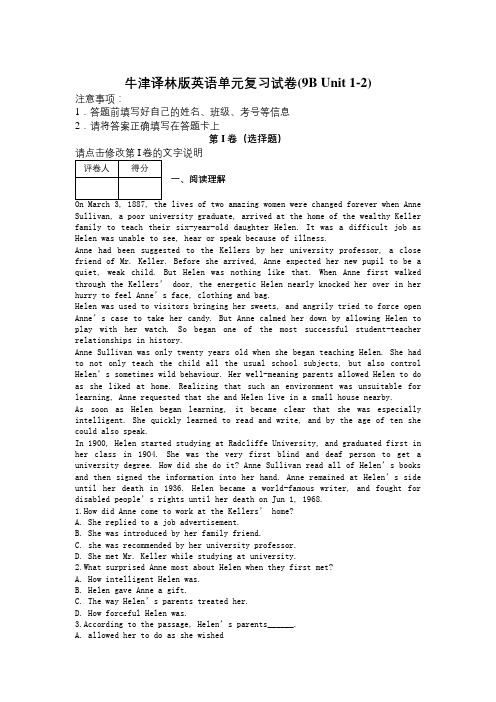
牛津译林版英语单元复习试卷(9B Unit 1-2)注意事项:1.答题前填写好自己的姓名、班级、考号等信息2.请将答案正确填写在答题卡上第I卷(选择题)一、阅读理解Sullivan, a poor university graduate, arrived at the home of the wealthy Keller family to teach their six-year-old daughter Helen. It was a difficult job as Helen was unable to see, hear or speak because of illness.Anne had been suggested to the Kellers by her university professor, a close friend of Mr. Keller. Before she arrived, Anne expected her new pupil to be a quiet, weak child. But Helen was nothing like that. When Anne first walked through the Kellers’ door, the energetic Helen nearly knocked her over in her hurry to feel Anne’s face, clothing and bag.Helen was used to visitors bringing her sweets, and angrily tried to force open Anne’s case to take her candy. But Anne calmed her down by allowing Helen to play with her watch. So began one of the most successful student-teacher relationships in history.Anne Sullivan was only twenty years old when she began teaching Helen. She had to not only teach the child all the usual school subjects, but also control Helen’s sometimes wild behaviour. Her well-meaning parents allowed Helen to do as she liked at home. Realizing that such an environment was unsuitable for learning, Anne requested that she and Helen live in a small house nearby.As soon as Helen began learning, it became clear that she was especially intelligent. She quickly learned to read and write, and by the age of ten she could also speak.In 1900, Helen started studying at Radcliffe University, and graduated first in her class in 1904. She was the very first blind and deaf person to get a university degree. How did she do it? Anne Sullivan read all of Helen’s books and then signed the information into her hand. Anne remained at Helen’s side until her death in 1936. Helen became a world-famous writer, and fought for disabled people’s rights until her death on Jun 1, 1968.1.How did Anne come to work a t the Kellers’ home?A. She replied to a job advertisement.B. She was introduced by her family friend.C. she was recommended by her university professor.D. She met Mr. Keller while studying at university.2.What surprised Anne most about Helen when they first met?A. How intelligent Helen was.B. Helen gave Anne a gift.C. The way Helen’s parents treated her.D. How forceful Helen was.3.According to the passage, Helen’s parents______.A. allowed her to do as she wishedB. gave her too many gifts and sweets.C. did not spend much time with herD. cared little about her education.4.Which of the following is NOT true about Helen’s university studies?A. She was greatly helped by Anne.B. She was the best student in her class.C. She was able to graduate in three years.D. She was the first deaf and blind university graduate.5.According to the passage, both Anne and Helen_____.A. died in their 60sB. were well educatedC. came from rich familiesD. fought for human rights第II卷(非选择题)二、书面表达假如你州Paul,是第一中学九年级学生,今年夏天即将毕业。
【原创】江苏译林版9BUnit1重点知识归纳解析

【原创】江苏译林版9BUnit1重点知识归纳解析9B Unit 1 重点知识归纳姓名______________一、重点词组或句型1. dried food 30. three-eights2. be cared for by robots 31. easily jump high3. put up a tent 32. become fashionable4. play the guitar 33. go somewhere quiet5. live on the planet 34. be as tasty as6. imagine doing sth. 35. not as … as7. develop plants 36. in many ways8. be sure of…37. be specially designed9. be sure to do sth. 38.at online schools10. float away into space 39. in the form of pills11. digital camera 40. 5 miles away from sp.12. by the year 2100 41. start with a discussion13. be certain 42. be enjoyable14. keep away (from) 43. be stored15. the early settlers 44. at present16. percentage of students 45. prepare to do17. the journey to Mars 46. in the form of pills18. connect A to B 47. compare …with…19. make themselves heavier20 walk on the surface of the planet21. get to my food = reach my food22. at half the speed of light23. What’s the population of…24. keep us from floating in the air25. compared the life on Earth26. more and more crowed and polluted27. various designs for settlers to choose from28. under the control of computers29. make the dream come true二、重点、难点1. How do you like …?= How do you find …? = What do you think of …?【例】How do you like your teacher, Mr. Li? (改为同义句)(1) What do you your teacher, Mr. Li?(2) How do you f your teacher, Mr. Li?2. get to(1) 吃到、够到eg. The little child too short to get to the food on the table.(2) 到达eg. When we got to the airport, the plane had taken off.【比较】get to + 地方(注意:当get to 后接here, there, home 等副词时,必须去掉to)arrive in + 大地方arrive at + 小地方reach + 地方eg. I will call you as soon as I get to / arrive in / reach Beijing.3. can 与be able tocan 用于一般现在时和一般过去式(could) 强调人们有做某事的能力be able to 现在时、过去时、将来时、完成时都可用强调通过努力而做某事eg. My son can swim now but he couldn’t last year.Though the fire spread through the hotel very quickly, everyone was able to get out. (表示通过努力)4. care for (1) = take care of = look after(2) = care about eg. He spent his life caring for the poor.5. form (1) n. 形状、形式eg. Swimming is a good form of exercise.(2) n. 表格eg. Please fill in the form first.(3) v. 组成、形成eg. We are going to form a class for beginners in English.6. play the guitarplay footballplay chess / cardshave breakfast / lunch / supperby car / bus / planeNew Year’s Day / Women’s Dayspeak Chinese / teach English7. put 常考词组put away 把…收拾(干净)put out 扑灭(火)put off 推迟put down 放下、记下put up 举起、建造、竖起put on 穿上put back 放回8. imagine ( n. imagination想象力、幻觉adj. imaginative 有想象力的)(1) vi “设想、想象”eg. You will like the film, I imagine.(2) vt “想象、设想、猜想”+ 名词、动名词、从句等eg. Try to imagine being on the moon.9. by the year 2100(1) by +将来的时间,常用将来时eg. Daniel is thinking about what life will be like by the year 2050.(2) by +过去的时间,常用过去完成时eg. By the end of last year, it had produced over 2000 computers.10. more and more beautiful“比较级+ 比较级” stronger and stronger11. crowded 拥挤的、挤满了人的crowd 群、人群eg. There were crowds of people at the theatre.eg. There was a crowd of 20,000 people at the football match.12. polluted 受到污染的pollute 污染eg. All those waste products are polluting the river.pollution [U] air ~, noise ~eg. There is a lot of pollution in the air here.13. hopefully hopeful hopelesshope to do eg. They waited wand waited because they hoped to see their favourite film stars.hope that eg. My father hopes that I can be a host in the future.wish to do eg. I wish to come tomorrow.wish sb to do eg. My parents wish me to become a policeman when I grow up.14. too…to…常与so…that…, not…enough to…的句型转换【重点:so that结构参考8B Unit 5, 9A Unit 2】eg. The water is too dirty to drink. = The water is so dirty that we can’t drink it.= The water is not clean enough to drink.15. at present 常用于现在进行时eg. My cousin is making kites at present.16. spacecraft 单复数同形 a manned spacecraft17. spend take pay cost afford 【重点:请参考8B Unit 2, 9A Unit 1】18. at the speed of at high /great speed at full / top speedeg. The car is driving at the speed of 150 kilometres an hour.19. humanhuman being 人类human nature 人性human right 人权【注意几个单词的复数】humans, Germans, walkmanspostmen, policemen, Englishman等20. develop development developed(发达的)developing (发展中的)21. three-eighths 分数的表示法:分子用基数词;分母用序数词(1) 分子大于1时,分母要加-s; one fourth three fourths(2) 分子和分母之间可用连字符,也可不用one-third【注意:分数作主语时】当分数作主语时,谓语动词的形式取决于与分数相关的名词或代词的数:(1) 如果主语是单数或不可数名词,谓语动词用单数形式eg. Three fourths of the surface is covered with water on Earth.(2) 如果主语是可数名词的复数,谓语动词用复数形式eg. About one-fifth of the students in our class are from the countryside.22. 代词it, that, one的区别it 特指上文提到的“同个、同物”I can’t find my pen. Where is it?that 特指上文提到的“同一类”,但不是同一个;常用于单数可数名词和不可数名词The weather in Moscow is colder than that in Beijing.one 泛指上文提到的名词所表示的人或事物的任一个I can’t find my pen. I have to buy one.23. prevent sb ( from ) doing = stop sb ( from ) doing = keep sb from doing【注意】在用于被动语态中,from不能省略He was stopped from driving because he was drunk lastnight.24. compare… with…. 把…与…进行比较eg. If you compare British football with American football, you will find many differences.compare…to…把…比作eg. Children are often compared to flowers.25. in many ways 在许多方面in different ways 以不同的方式in the same way 以同样的方式in some ways 在某些方面,在某种程度上in the way 挡道、妨碍on the way…在路上、在途中by the way 顺便问一下26. connect…to…把…和…连接起来eg. Did you connect the keyboard to the computer properly?27. as + 形容词/ 副词的原形+ asnot so /as + 形容词/ 副词的原形+ as “不如”eg. Jack doesn’t run as fast as Tom.= Tom runs faster than Jack.28. space (1) 太空[U],前面一般不用冠词eg. On June 16th, 2012, Liu Yang became the first woman to go into space in China.(2) 空间[U] = roomeg. Excuse me, can you make some space for me?29. population 人口(1) [U] eg. What is the population of China? Shanghai has a population of 20,800,000 at present.(2) 人口的“多和少”时,只能用large或small 【参考price的用法】The population of China is much larger than that of Japan.30. enjoyable enjoy ( oneself / doing sth )31. provide sb. with sth = provide sth for sb 【注意常用于被动语态】eg. They provide the poor people with food and clothes.offer sb sth = offer sth to sb. eg. He offered the people his great help.32. fix up = repair eg. He is fixing up his bike.fix…on eg. He fixed the machine on the ground.33. advantage [C U] disadvantage [C U] 用作可数名词的时候较多eg. Living in the big city has many advantages, such as good schools, libraries, hospitals and theatres.34. start with… = begin with …35. harm [U] harmful harmless(1) harm [U] eg. There is no harm in trying.(2) do harm to eg. Such books do great harm to young people.(3) be harmful to eg. Watching too much TV is harmful to your eyesight.36. have sb. do sth. 让某人做某事eg. Why not have your brother take a message for us?have sth. done (常指请人把)某事被做eg. Next Sunday, I will have my computer repaired.have sth. to do 有某事要做eg. I have something important to say.37. feel like doing 想做某事would like to do38. go somewhere quietgo somewhere quietly39. specially “专门、特地”eg. The red dress is speciallydesigned for Zhang Ziyi.especially “尤其、特别地”eg. Stay away from junk food, please. It’s bad for us, especially for children.40. can 和could(1) 表示能力“能、会”( could是过去式) eg. I can speak Japanese.(2) 表示请求“可以”( could比can更客气) eg. Can / Could I use this dictionary? Yes, You can.(3) 表示推测“一定不”( could是过去式) eg. This pen can’t be Li Ming’s.41. may 和might(1) 表示“允许”( might是过去式) eg. You may sit down now.(2) 表示“请求”( might 比may更委婉) eg. May / Might I try again? Yes, you may. / No, you may not.。
译林牛津版9B Unit1知识点清单与练习

9B Unit 1 Asia 单元知识总结Comic strip and Welcome to the unit预习指导1. 太多的山_________________2. 步行____________________________3. 坚持到底___________________4. 一段很长的路要走________________5. 在回家路上_________________6. 好好休息一下____________________7. 中国剪纸___________________ 8. 用筷子吃饭______________________要点解析1.Wow, the Great Wall is amazing, isn’t it? 哇,长城太神奇了,不是吗?①amaze是动词,意为“使惊奇”Your patience amazes me. 你的毅力使我惊讶。
②amazed为过去分词,用作形容词,意为“感到惊奇的”,修饰人。
I was amazed to meet him there. 我很惊讶在那见到他。
③该句为反意疑问句:前否很肯,前肯后否。
They hardly have any spare time for hobbies, do they?2.I’m taking a rest.现在进行时表示将来的用法。
其中I’m taking a rest 是用现在进行时表示将来的动作,即说话之前已经计划好的事情。
英语中come, go , move ,leave ,stay, walk, arrive, fly , drive , ride , take, plan等动词常用进行时表示确切的计划或已经安排好的活动。
Eg,I hear you are driving to Florida for your vacation.中考链接The summer holidays are coming ,so the twins as well as Jack to Hong Kong for vacation.A. is goingB. are goingC. goes D .go3. There’s still a long way to go. we’d better continue to the end. 虽然仍有很长的路要走,但是我们最好坚持到最后。
牛津译林英语9BUnit1考点及练习

牛津译林英语9BUnit1考点及练习1)反意疑问句反意疑问句的几个特殊形式:Someone went home, _____ ______?Everything is ready, _____ ______?You’d better ask the policeman, _____ ______?They’ve never been there before, _____ ______?Open the window, _____ ______?Let’s meet outside the school gate, _____ ______?There is little milk in the glass, _____ ______?I think she is right, _____ ______?didn’t he/they? isn’t it; hadn’t you? ;have they? ;will you? shall we? is there? isn’t she?①不定代词everyone,someone,somebody,everybody等作陈述句的主语时,附加问句的主语在正式语体中用he,在非正式语体中用they。
②this,that,something,everything,anything,nothing以及动词不定式(短语)、现在分词(短语)等作陈述句的主语时,附加问句的主语常用it。
③当陈述句中出现had better时,附加问句用hadn’t。
④当陈述句中带有never,hardly,few,little,nothing,nobody,none等这类否定词时,附加问句要用肯定形式。
⑤当陈述部分为祈使句时,附加问句一般用“will you?”。
⑥以Let’s(包括听话人在内)开头的祈使句,附加问句常用“shall we?”;但以Let us(不包括听话人在内)开头的祈使句,附加问句常用“will you?”。
- 1、下载文档前请自行甄别文档内容的完整性,平台不提供额外的编辑、内容补充、找答案等附加服务。
- 2、"仅部分预览"的文档,不可在线预览部分如存在完整性等问题,可反馈申请退款(可完整预览的文档不适用该条件!)。
- 3、如文档侵犯您的权益,请联系客服反馈,我们会尽快为您处理(人工客服工作时间:9:00-18:30)。
新译林9B英语UNIT 1单元知识点归纳及练习题9B UNIT 1一、词汇大集合1. It says 上面写着,上面显示2. eat up 吃光,吃完(use up 用完,用尽)(代词的位置)3. be well organized 很有条理的4. keep ……in good order 使……保持井然有序(in order 按顺序)5. show off 炫耀,卖弄(show sb around sp 带领某人参观某地show sb the way to 给某人指到某地的路)6. show no interest in 对……毫不感兴趣7. repeat grammar rulers for us 为我们重复语法规则8. come up with (= think of 想出,提出);追上,赶上9. be curious about 对…感到好奇10. get angry easily 容易生气(anger n.)11. make a good accountant 成为一名优秀的会计12. neither ……nor ……既不……也不……(就近原则)Neither he nor I am well educatedeither……or ……或者……或者……both……and ……两者都连接两个主语时,谓语动词用复数形式13. He didn’t come here yesterday , neither / nor did I 他昨天没来这儿,我也是拓展:so, neither 位于分句或句子的开头,这种结构通常表示前面所说的情况也适合于另一个人(或事物),表示“我也这样”之类的概念。
其句型可归纳为:so / neither + be / have / 助动词/ 情态动词+ 主语。
如:—I won't do such a thing. 我可不做这样的事。
—Neither will he. 他也不会。
—She is interested in the story. 她对这个故事感兴趣。
—So am I. 我也是。
温馨提示1:如果第二分句只是重复前句的意思,用来表示赞同时,so 之后的主语和谓语就不能颠倒。
如:—It was cold yesterday. 昨天天气很冷。
—So it was. 是很冷。
温馨提示2:so, neither 开头的倒装句一定要与上句的时态保持一致。
如:—Peter doesn't like swimming. —Neither does Tom.—Peter went to school by bus yesterday. —So did Tom.温馨提示3:so, neither 开头的倒装句中的助动词或情态动词要根据人称的变化而变换。
如:—Peter doesn't like swimming. —Neither do I.14. work without speaking all day long 整天工作不说话15. be happy with = be satisfied with 对……感到满意16. a born artist 一个天生的艺术家17. impress the whole country with his creative work 他的富有创造力的作品给全国人民留下深刻的印象Impress 的用法:impress sth on/upon sb 使…铭记…;使想象impress sb. (with sth.) 给予某人深刻印象be impressed by/with/at sth 对…印象深刻impress sth. on/in sth. 在…上/压/盖印(次要知识点)例句①I impressed on him the importance of his work. 我使他注意他的工作的重要性。
②The organizer impressed a beautiful design on the clothes. 组织者把一个漂亮的图案印在衣服上。
③The girl impressed her friends with liveliness and humor. 这个女孩给她的朋友留下了活泼和幽默的印象。
④We were deeply impressed by his deeds. 我们对他的行为留下了深刻印象。
拓展:impression [C] 释义:an effect, a feeling, or an image retained as a consequence of experience 印象,感想:作为经历的结果留下来的效果、感觉或者形象例句①What were your first impressions of London? 你对伦敦的最初印象如何?②Her speech made an quite impression on the audience. 她的演讲给听众留下相当好的印象。
词组:give/create/leave /make a/an…impression on sb.例句③My general impression is that he seemed to be a pleasant man. 我的总的印象是他是一个很阳光的人。
18. win high praise from the art community 赢得艺术团的高度赞扬praise sb for sth 因某事表扬某人19. give up 放弃(代词放中间)give up doing sth = stop doing sth 放弃做某事20.work for the sales department in a big company 在一家大公司的销售部工作21.day after day 日复一日22.the general manager 总经理23.take the lead 处于领先地位,带头24. fall behind 落后25. (fall in 生病) 过去分词:fallen;过去式:fell26. be ready to do 准备做某事27. take on new challenges 接受新的挑战28. the chief engineer 首席工程师29. connect……with/to ……把……和……连接起来30. be connected with 与……有联系31. a miss is as good as a mile 差之毫厘,谬以千里(as good as 与……几乎一样,简直是)32. can’t afford to do 负担得起(费用、损失、后果)多用于否定句和疑问句中33. make mistakes 犯错误34. pay attention to every detail 注意每个细节(to 为介词+ doing sth )35. work to high standards 工作高标准36. easy to work with 容易一起工作37. a pioneer heart surgeon 一位心脏外科手术的带头人38. can’t be too careful = can never be too careful 再怎么细心也不为过39. be willing to do sth 愿意做某事40. perform/do an operation on sb 给某人做手术41. devote oneself/ one’s life / time to 把……奉献给……(to 为介词,后接名词,代词,动名词)42. respect sb = have / show respect for sb 尊重,尊敬某人43. be suitable for 适合Grammar and Integrated Skills and Study Skills44. accept others’advice 接受别人的建议45. think twice (about sth )三思而行46. be /get angry with sb 生某人的的气47. be /get angry at/ about sth 因某事而生气48. worry too much 担心太多49. be patient / impatient with 对……有/ 没有耐心50. not only ……but (also )……不但……而且……(就近原则)51. do the dishes 洗碗,洗餐具52. animal signs 生肖53. appear in a fixed order 按照固定的顺序出现54. make his lesson lively and interesting 使他的课上得生动而有趣(lively 活泼的,生气勃勃的指人或物)live,alive,living,lively 的区别1)alive 意为“活着”,侧重说明生与死之间的界限,既可指人,也可指物;可用来作表语,后置定语或宾补。
例如:No man alive is greater than he . 在活着的人中没有人比他更伟大了。
(注:此时alive 含有“在所有活着的……之中”)He wanted to keep the fish alive . 他想让鱼活着。
2)living 意为“活着”强调说明“尚在人间”,“健在”,可用来指人或物,作定语或表语。
例如:My first teacher is still living . 我的启蒙老师仍健在。
English is a living language . 英语是活的语言。
注意:living 前加上the , 表示类别,指“活着的人们”。
living 还可用于短语,例如:make a living 谋生。
make a / one's living by + ing 通过干……谋生3)live “活着的”,通常指物,不指人,常用来作定语放名词的前面。
还指“实况转播的”。
例如:a live wire 有电的电线,a live fish 一条活鱼。
4)lively 则意为“活泼的”,“活跃”,“充满生气的”,可作定语、表语或宾补,既可指人,又可指物。
例如:Jenny is a lively girl . 詹妮是个活泼的女孩。
Everything is lively here . 这儿一切都生机勃勃。
55. in all 总共,总计56. people born under the same star sign 出生在同一星座下的人们57.share similar personalities 具有相似的个性58.be similar to 与……相似59. be similar in 在某方面相似be similar to 后边既可以加物主代词又可以加人,即:be similar to sth/sb be similar with 后边只可以加人,即be similar with sb 例如:My problems are similar to yours. 我的问题与你的类似。
